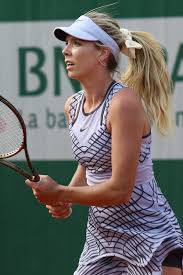Katie Boulter: ‘You Just Don’t Know If They’re Nearby’ — Tennis Star Reveals Harrowing Abuse After French Open Win.
Katie Boulter had just lost a first-set tie-break at the French Open when the abuse began.
The outcome of the match didn’t matter—despite going on to secure a 6-7 (4-7), 6-1, 6-1 comeback victory—vile messages flooded her inbox.
“Hope you get cancer,†read one.
Another, filled with expletives, threatened to desecrate her grandmother’s grave, adding, “candles and a coffin for your entire family.â€
A third said chillingly: “Go to hell, I lost money my mother sent me.â€
Now, ten days later, as she scrolls through those messages, Boulter’s response is a mixture of despair, fear, and resignation.
The British No. 2 agreed to speak with BBC Sport to expose the scale and nature of abuse tennis players receive online—sharing screenshots of her inbox as part of a candid effort to raise awareness.
‘This Is the Norm Now’
Boulter, 28, says she’s speaking out for two reasons: first, to highlight how normalized this abuse has become; second, to warn of the lasting impact on younger players entering the sport.
“At the start of my career, I took it very personally—especially comments about my appearance,†she said. “It becomes more frequent every time you open your phone. The things people say now… nothing’s off limits.â€
The most disturbing message—threatening her family—was sent during her French Open first-round match against France’s Carole Monnet on 29 May.
Though she rebounded to secure her first main draw win at Roland Garros, the victory was tainted by the abuse that followed.
Reflecting on it now, she admits it’s difficult to separate genuine threats from empty vitriol.
“You just don’t know if that person is on site, if they’re nearby, or if they know where you live,†Boulter said. “It really shows how vulnerable we are.â€
She paused, visibly shaken, as she reread the message wishing her cancer.
“I just wonder—who sends something like that? I wouldn’t say that to my worst enemy.â€
Betting Abuse a Major Driver
Boulter believes most of the abuse comes from disgruntled gamblers—often appearing both after wins and losses.
“It’s not just after emotional defeats,†she said. “Even when you win, you get flooded with it.â€
She has learned to avoid her direct messages entirely, but the emotional toll is clear.
Statistics obtained by BBC Sport underscore the scale of the problem. In 2024 alone, around 8,000 abusive or threatening messages were sent publicly to 458 tennis players, according to data provided by Signify, the ITF, and WTA.
Betting-related abuse accounted for 40% of all detected incidents. One prolific account sent 263 abusive messages; 15 were referred to law enforcement. Of the 10 worst offenders—most linked to gambling—nine had their accounts suspended or content removed.
The details of 39 account holders were shared with tennis and betting authorities for further action.
A Betting and Gaming Council spokesperson told the BBC: “Our members do not tolerate abuse on social media, which has no place in betting or sport. Social media companies must act swiftly and remove offensive content.â€
Meta, owner of Instagram and Facebook, declined to comment but noted it has developed tools to filter and hide abusive content.
‘Explicit Pictures Are Another Problem’
In addition to threats, Boulter says players are also frequently sent explicit images.
“I’ve received quite a few,†she revealed. “Thankfully, Instagram filters catch a lot of it, but it still ends up in message requests. It’s a huge problem—young players shouldn’t be seeing that.â€
On rare occasions, Boulter has responded to abusers—hoping a kind message might prompt reflection.
“Sometimes they reply saying, ‘I’m a huge fan, I didn’t mean it.’ They don’t realize how hurtful their words are until confronted.â€
As Wimbledon approaches, Boulter expects the abuse to intensify.
“Wimbledon’s always big. And now, with Alex \[de Minaur] and I together, we get it from both sides—people message me when he loses and vice versa.â€
Other Players Speak Out
Boulter is not alone. French star Caroline Garcia, former world No. 30, previously pleaded with online trolls to “remember we are human,†and criticized tournaments’ ties to betting firms.
US stars Iga Swiatek, Jessica Pegula, and Taylor Townsend have also shared their experiences with abuse, with Pegula noting: “Death threats and family threats are normal now.â€
Townsend published a screenshot of a racist death threat she received in 2023. Fellow players Sloane Stephens and Jay Clarke have also spoken out about racism on social media.
This issue goes beyond tennis. England footballers Marcus Rashford, Bukayo Saka, and Jadon Sancho were all subjected to horrific online abuse after Euro 2020.
What’s Being Done?
In January 2024, tennis authorities introduced Threat Matrix, an AI-driven system developed by Signify, to detect abusive messages and escalate them to appropriate channels. It now protects WTA and ITF players year-round, with enhanced coverage during Grand Slams.
Players can also report direct message abuse and receive security advice.
Sally Bolton, CEO of the All England Club, says social media has intensified the abuse athletes face.
“Abuse has always existed, but social media has made it worse. Betting on sport is a reality, so we have to find ways to mitigate that risk.â€
The WTA and ITF insist online abuse is a “key priority†and say that punishing offenders—including bans and law enforcement referrals—is essential.
They also defend data-sharing partnerships with betting firms as a way to regulate markets and fund protection efforts like Threat Matrix.
“Betting on sport is inevitable,†a joint statement said. “What matters is ensuring it’s based on official data and regulated, not driven by illegal markets where abuse thrives unchecked.â€
Signify CEO Jonathan Hirshler added: “Most abuse comes from a small group. Greater cooperation between betting operators, social media platforms, and law enforcement is the next step in tackling this crisisis.â€



No comments yet
Be the first to share your thoughts!